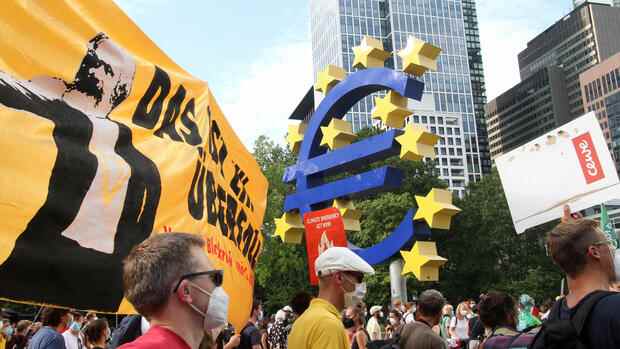Don’t overestimate risks.
(Photo: imago images/Ralph Peters)
The European Central Bank (ECB) has subjected the banks to a stress test in order to capture the risks from global warming in their loan books. For the 41 largest banks in the euro area, these risks would amount to just €70 billion from the short-term effects of higher carbon prices and extreme weather events.
With total assets of EUR 25 trillion and equity of all 113 banks supervised by the central bank totaling EUR 1.6 trillion, this is not a serious threat. Even the worst-case scenario of the 30-year stress test only resulted in losses of less than 0.2 percent of banks’ loans. But instead of giving the all-clear, the ECB emphasized that 65 percent of all banks had performed poorly and announced that it would apply tougher criteria to the next test.
Stuart Kirk from the major bank HSBC explained why the losses are so low in the lecture “Why Investors need not worry about climate risk” (in German: Why investors do not have to worry about climate risks): The loan term at HSBC is six years, a period in which even the most skeptical climate models do not predict any catastrophes. Central banks that still want to identify risks therefore need additional assumptions. The ECB assumes a severe recession in the future.
The central banks of Denmark and Great Britain have already included sharply rising interest rates in their climate impact models. The banking system is hit hard by both, but this has less to do with climate change than with the economic environment. It is rather unlikely that the central banks would react to a climate crisis by raising interest rates.
Top jobs of the day
Find the best jobs now and
be notified by email.
Kirk lost his job after his lecture. Researchers at the Federal Reserve Bank of New York fared better. In one study, they asked, “How bad are weather disasters for banks?” and answered, not really bad.
Disasters increase the demand for credit
Because catastrophes increase the demand for credit, which increases the profits of larger banks. Smaller banks benefit from local knowledge and, for example, avoid issuing mortgages in areas where the risk of flooding due to climate change is increasing.
At its core, the ECB is concerned with controlling lending. Together with organizations like Greenpeace, she regrets that almost two-thirds of the banks’ income comes from greenhouse gas-intensive industries.
Daniel Stelter is the founder of the discussion forum beyond the obvious, which specializes in strategy and macroeconomics, as well as a management consultant and author. Every Sunday his podcast goes online at www.think-bto.com.
(Photo: Robert Recker/ Berlin)
But we still need them to make the transition to a climate-neutral world. With the CO2 price, we already have a sufficient instrument to send the right signals to the market. Planned credit control will make the restructuring unnecessarily inefficient and expensive.
To paraphrase Kirk, “What is particularly annoying is that instead of thinking about inflation and explaining why it is spiraling out of control, central banks spend too much time on climate risks.”
More: Why our energy policy does more good than harm to Putin.
